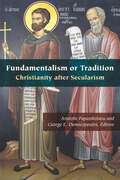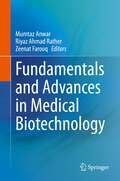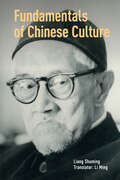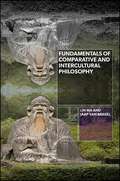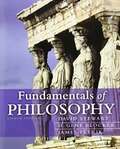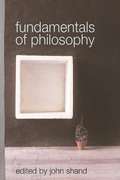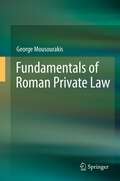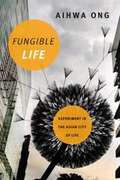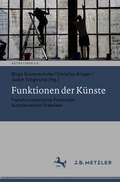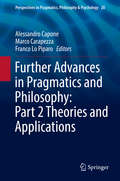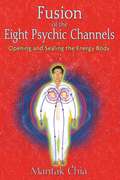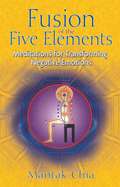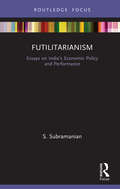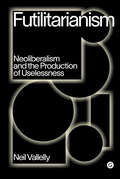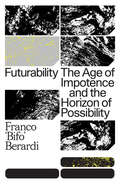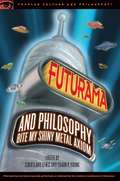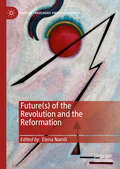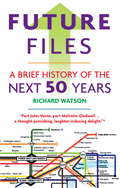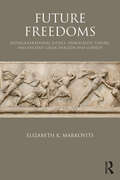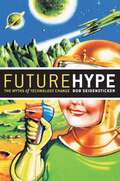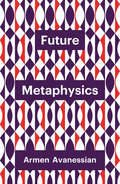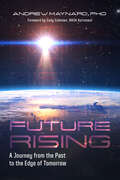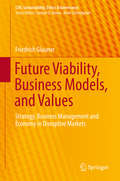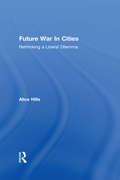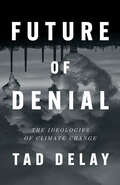- Table View
- List View
Fundamentalism or Tradition: Christianity after Secularism (Orthodox Christianity and Contemporary Thought)
by Aristotle Papanikolaou and George E. DemacopoulosTraditional, secular, and fundamentalist—all three categories are contested, yet in their contestation they shape our sensibilities and are mutually implicated, the one with the others. This interplay brings to the foreground more than ever the question of what it means to think and live as Tradition. The Orthodox theologians of the twentieth century, in particular, have emphasized Tradition not as a dead letter but as a living presence of the Holy Spirit. But how can we discern Tradition as living discernment from fundamentalism? What does it mean to live in Tradition when surrounded by something like the “secular”? These essays interrogate these mutual implications, beginning from the understanding that whatever secular or fundamentalist may mean, they are not Tradition, which is historical, particularistic, in motion, ambiguous and pluralistic, but simultaneously not relativistic.Contributors: R. Scott Appleby, Nikolaos Asproulis, Brandon Gallaher, Paul J. Griffiths, Vigen Guroian, Dellas Oliver Herbel, Edith M. Humphrey, Slavica Jakelić, Nadieszda Kizenko, Wendy Mayer, Brenna Moore, Graham Ward, Darlene Fozard Weaver
Fundamentals and Advances in Medical Biotechnology
by Mumtaz Anwar Riyaz Ahmad Rather Zeenat FarooqThis book serves as an introduction to the concepts of medical biotechnology, with great details about fundamentals and early disciplines of study as well as emerging fields and the latest research. The book follows a chronological order from the earliest discoveries and breakthroughs of medical biotechnology to the latest areas of study. The book contains up-to-date citations for each chapter and section, which makes it easy for the reader to understand the concept and also to follow the latest developments in the particular area. It is an ideal book for undergraduate and graduate students who aspire to derive basic knowledge and are also keen on learning about the latest advancements in the field of medical biotechnology.
Fundamentals of Chinese Culture
by Liang ShumingChinese culture, to readers of English, is somewhat veiled in mystery. Fundamentals of Chinese Culture, a classic of great insight and profundity by noted Chinese thinker, educator and social reformist Liang Shuming, takes readers on an intellectual journey into the five-thousand-year-old culture of China, the world’s oldest continuous civilization. With a set of Chinese-style cultural theories, the book well serves as a platform for Westerners' better understanding of the distinctive worldview of the Chinese people, who value family life and social stability, and for further mutual understanding and greater mutual consolidation among humanities scholars in different contexts, dismantling common misconceptions about China and bridging the gap between Chinese culture and Western culture. As a translation of Liang Shuming’s original text, this book pulls back the curtain to reveal to Westerners a highly complex and nuanced picture of a fascinating people.
Fundamentals of Comparative and Intercultural Philosophy (SUNY series in Chinese Philosophy and Culture)
by Lin Ma Jaap van BrakelThis innovative book explores the preconditions necessary for intercultural and comparative philosophy. Philosophical practices that involve at least two different traditions with no common heritage and whose languages have very different grammatical structure, such as Indo-Germanic languages and classical Chinese, are a particular focus. Lin Ma and Jaap van Brakel look at the necessary and not-so-necessary conditions of possibility of interpretation, comparison, and other forms of interaction and how we can speak of similarities and differences in this context. The authors posit that it is necessary to dissolve the question of universalism versus relativism by replacing the ideal language paradigm with a paradigm of family resemblances and that it is not necessary to share a common language to engage in comparison. Numerous case studies are presented, including many comparisons of Western and Chinese concepts.
Fundamentals of Philosophy
by David Stewart H. BlockerThematically introduces students to the major philosophic thinkers. <p><p> Fundamentals of Philosophy offers a broad scope of classic and contemporary selections from the world’s major thinkers via a narrative format that presents difficult issues and readings in a simplified manner for students. <p><p> Its readings are grouped around nine major themes/chapters, and are organized as a debate on one central issue. This approach helps students understand the argumentative style of philosophy, and learn how philosophic issues and solutions they encounter can be applied to their everyday life. <p><p> A better teaching and learning experience This program will provide a better teaching and learning experience―for you and your students. Here’s how: <p> Improve Critical Thinking – “Questions for Discussion” and a “Glossary of Terms” help students study. <p> Engage Students – “Biographies” and “Recent Developments” stimulate student interest and understanding of philosophy’s contemporary applications. <p> Support Instructors – An Instructor’s Manual to accompany the text are available to be packaged with this text.
Fundamentals of Philosophy
by John ShandFundamentals of Philosophy is a comprehensive and accessible introduction to philosophy. Based on the well-known series of the same name, this textbook brings together specially commissioned articles by leading philosophers of philosophy's key topics.Each chapter provides an authoritative overview of topics commonly taught at undergraduate level, focusing on the major issues that typically arise when studying the subject. Discussions are up to date and written in an engaging manner so as to provide students with the core building blocks of their degree course. Fundamentals of Philosophy is an ideal starting point for those coming to philosophy for the first time and will be a useful complement to the primary texts studied at undergraduate level. Ideally suited to novice philosophy students, it will also be of interest to those in related subjects across the humanities and social sciences.
Fundamentals of Roman Private Law
by George MousourakisRoman law forms a vital part of the intellectual background of many legal systems currently in force in Continental Europe, Latin America, East Asia and other parts of the world. Knowledge of Roman law, therefore, constitutes an essential component of a sound legal education as well as the education of the student of history. This book begins with a historical introduction, which traces the evolution of Roman law from the earliest period of Roman history up to and including Justinian's codification in the sixth century AD. Then follows an exposition of the principal institutions of Roman private law: the body of rules and principles relating to individuals in Roman society and regulating their personal and proprietary relationships. In this part of the book special attention is given to the Roman law of things, which forged the foundations for much of the modern law of property and obligations in European legal systems. Combining a law specialist's informed perspective with a historical and cultural focus, the book provides an accessible source of reference for students and researchers in many diverse fields of legal and historical learning.
Fungible Life: Experiment in the Asian City of Life
by Aihwa OngIn Fungible Life Aihwa Ong explores the dynamic world of cutting-edge bioscience research, offering critical insights into the complex ways Asian bioscientific worlds and cosmopolitan sciences are entangled in a tropical environment brimming with the threat of emergent diseases. At biomedical centers in Singapore and China scientists map genetic variants, disease risks, and biomarkers, mobilizing ethnicized "Asian" bodies and health data for genomic research. Their differentiation between Chinese, Indian, and Malay DNA makes fungible Singapore's ethnic-stratified databases that come to "represent" majority populations in Asia. By deploying genomic science as a public good, researchers reconfigure the relationships between objects, peoples, and spaces, thus rendering "Asia" itself as a shifting entity. In Ong's analysis, Asia emerges as a richly layered mode of entanglements, where the population's genetic pasts, anxieties and hopes, shared genetic weaknesses, and embattled genetic futures intersect. Furthermore, her illustration of the contrasting methods and goals of the Biopolis biomedical center in Singapore and BGI Genomics in China raises questions about the future direction of cosmopolitan science in Asia and beyond.
Funktionen der Künste: Transformatorische Potentiale künstlerischer Praktiken (Ästhetiken X.0 – Zeitgenössische Konturen ästhetischen Denkens)
by Judith Siegmund Birgit Eusterschulte Christian KrügerDie Beiträge des Bandes stellen die Frage nach der Zweckmäßigkeit und Produktivität von Kunst und verhandeln diese im Spannungsfeld von Autonomie und Funktionalisierung. Aus unterschiedlichen disziplinären Perspektiven werden die Spielräume zwischen Kunst und gesellschaftlicher Praxis in den Blick genommen und Funktionen und Wirksamkeiten künstlerischer Praxis in Bezug auf gesellschaftliche Bereiche wie das Soziale oder das Politische diskutiert. Dabei finden zeitgenössische Phänomene in verschiedenen Bereichen der performativen und bildenden Künste besondere Beachtung. Den Leserinnen und Lesern werden neue Perspektiven auf Kunstphänomene eröffnet, die als künstlerische Praxis in prägnanter Weise den autonomen Bereich der Künste verlassen.
Further Advances in Pragmatics and Philosophy: Part 2 Theories and Applications (Perspectives in Pragmatics, Philosophy & Psychology #20)
by Alessandro Capone Franco Lo Piparo Marco CarapezzaThe two sections of this volume present theoretical developments and practical applicative papers respectively. Theoretical papers cover topics such as intercultural pragmatics, evolutionism, argumentation theory, pragmatics and law, the semantics/pragmatics debate, slurs, and more. The applied papers focus on topics such as pragmatic disorders, mapping places of origin, stance-taking, societal pragmatics, and cultural linguistics. This is the second volume of invited papers that were presented at the inaugural Pragmasofia conference in Palermo in 2016, and like its predecessor presents papers by well-known philosophers, linguists, and a semiotician. The papers present a wide variety of perspectives independent from any one school of thought.
Fusion of the Eight Psychic Channels: Opening and Sealing the Energy Body
by Mantak ChiaAdvanced Inner Alchemy exercises that promote the free flow of energy throughout the body in preparation for the Practice of the Immortal Tao• Explains how to open the Great Bridge Channel and the Great Regulator Channel• Includes exercises to strengthen and wrap the spinal cord with energy• Reveals how to create a thicker aura to protect the body and receive the higher frequencies of the Universal ForceThe Fusion of the Eight Psychic Channels practice builds upon the Fusion of the Five Elements and Cosmic Fusion practices and is the final step in preparation for the Practice of the Immortal Tao. Master Mantak Chia shows how to open the Great Bridge Channel and the Great Regulator Channel--the last of the eight psychic channels that connect the twelve organ meridians and enable energy to flow from one meridian to another. By opening these psychic channels in conjunction with the Microcosmic Orbit, practitioners can balance and regulate the energy flow throughout the body to protect all the body’s centers.Master Chia also illustrates the Spinal Cord Microcosmic Orbit practice, which strengthens and wraps the spinal cord with energy, and the practice of Sealing the Aura, which creates a thicker aura to protect the body and facilitate the reception of higher frequencies of the Universal Force. Mastery of the practices in this book enables the creation of the energy body needed to receive the larger Universal Force vibrations accessible through the Practice of the Immortal Tao.
Fusion of the Five Elements: Meditations for Transforming Negative Emotions
by Mantak ChiaA guide to the practice of Inner Alchemy, which allows you to control the energies of your inner universe to better connect with energies of the outer universe • Teaches the essential first-level meditations in Taoist practice, also known as Fusion of the Five Forces, for self-healing and emotional and spiritual development • Shows step-by-step how to remove negative emotions from the organs in which they are lodged by neutralizing and transforming the negativity back into positive energy • Includes basic and advanced-level meditations Fusion of the Five Elements is the necessary first step in the Taoist practice of Inner Alchemy, in which one learns to control the generation and flow of emotional, mental, and physical energies within the body. It is a series of meditations designed to locate and dissolve negative energies trapped inside the body by making a connection between the five outer senses (experienced through the ears, eyes, nose, mouth, and tongue) and the five major negative emotions (anger, hate, worry, sadness, and fear). When the body is cleared of negative energy, universal chi energy flows freely and productively, nourishing both body and soul. The practice is divided into two parts. The first works with controlling the forces of the five elements on the five major organs of the body by learning the elements’ effects upon each other and how to balance and utilize these energies properly. The advanced Fusion exercises then show how to channel the greater energies of the stars and planets to strengthen internal weaknesses and crystallize positive energy. By “fusing” all the different kinds of energy together, a harmonious whole is created--the key to manifesting an Immortal existence.
Futilitarianism: Essays on India’s Economic Policy and Performance
by S. SubramanianThis volume is an overview of, and commentary on, aspects of contemporary India and its socio-economic policies. It focuses on India’s economy and society in recent years, and in the process it addresses structural issues of development such as those of population, poverty, inequality, health, and social exclusion. It reviews the adequacy and appropriateness of governmental response to these problems, in terms of public policy, narrowly conceived, and philosophical orientation, more broadly conceived. The concern is not only with economic achievement and human development but also with the framework of civic rights, personal liberty, and institutional autonomy within which the exercise of governance is perceived to be carried out. The essays in this volume were originally written with the general-reader-as-involved-citizen very much in mind as the intended target. However, it should also be of interest to scholars of economics, political science, development studies, and South Asian studies.
Futilitarianism: Neoliberalism and the Production of Uselessness (Goldsmiths Press / PERC Papers)
by Neil VallellyA proposal for countering the futility of neoliberal existence to build an egalitarian, sustainable, and hopeful future.If maximizing utility leads to the greatest happiness of the greatest number of people, as utilitarianism has always proposed, then why is it that as many of us currently maximize our utility--by working endlessly, undertaking further education and training, relentlessly marketing and selling ourselves--we are met with the steady worsening of collective social and economic conditions? In Futilitarianism, social and political theorist Neil Vallelly eloquently tells the story of how neoliberalism transformed the relationship between utility maximization and the common good. Drawing on a vast array of contemporary examples, from self-help literature and marketing jargon to political speeches and governmental responses to the COVID-19 pandemic, Vallelly coins several terms--including "the futilitarian condition," "homo futilitus," and "semio-futility"--to demonstrate that in the neoliberal decades, the practice of utility maximization traps us in useless and repetitive behaviors that foreclose the possibility of collective happiness. This urgent and provocative book chimes with the mood of the time by at once mapping the historical relationship between utilitarianism and capitalism, developing an original framework for understanding neoliberalism, and recounting the lived experience of uselessness in the early twenty-first century. At a time of epoch-defining disasters, from climate emergencies to deadly pandemics, countering the futility of neoliberal existence is essential to building an egalitarian, sustainable, and hopeful future.
Futurability: The Age of Impotence and the Horizon of Possibility
by Francesco BerardiA comprehensive philosophy of contemporary life and politics, by one of the sharpest critics of the presentWe live in an age of impotence. Stuck between global war and global finance, between identity and capital, we seem to be incapable of producing the radical change that is so desperately needed. Is there still a way to disentangle ourselves from a global order that shapes our politics as well as our imagination?In his most systematic book to date, renowned Italian theorist Franco Berardi tackles this question through a solid yet visionary analysis of the three fundamental concepts of Possibility, Potency, and Power. Characterizing Possibility as the content, Potency as the energy, and Power as the form, Berardi suggests that the road to emancipation unravels from the awareness that the field of the possible is only limited, and not created, by the power structures that implement it. Other futures and other worlds are always already inscribed within the present, despite power’s attempt at keeping them invisible. Overcoming any temptation of giving in to despair or nostalgia, Berardi proposes the notion of Futurability as a way to remind us that even within the darkness of our current crisis lies dormant the horizon of possibility.From the Hardcover edition.
Futurama and Philosophy
by Courtland Lewis Shaun P. YoungFuturama is a quirky, animated sitcom created by Simpson's mastermind, Matt Groening. It follows the adventures of a pizza delivery man transported far, far into a cosmic future of witty, sarcastic robots and one-eyed femme fatales. Since first airing on the Fox network from 1999 to 2003, Futurama's many dedicated fans created websites and newsletters and organized Comic-Con meetups and letter-writing campaigns in hopes of learning the further adventures of Bender, Leela, Dr. Farnsworth, and the deliveryman Philip J. Fry. In the meantime, fans survived on syndicated re-runs, books, wall calendars, and four feature-length movies released on DVD and online streaming.In 2009, Fox announced that Futurama would have a future and new episodes returned to Comedy Central channel. Futurama and Philosophy will meet this new surge of interest and popularity in its Popular Culture and Philosophy series. Twenty-first-century philosophers and Futurama fans can compare notes about time travel, alternate universes, the evolution of life, artificial intelligence, and the ethical dilemmas of suicide booths, "mad" scientists like Farnsworth and robots like Bender who aspire to bad taste and "kiss-my-metal-ass" rudeness. Would "interplanetary golf" really be possible? Why is it that a fossilized dog is really "man's best friend"? What is going on inside Dr. Zoidberg's Freedom Lesson? Why is Bender, in fact, a responsible moral being? Is Death Intrinsically Bad? And what's with the "Seriously Freaked Up Nature of Morality" exhibited in the show?Fans who appreciate the wit and wisdom Futurama's characters, and especially the cosmic, existential framework in which their adventures unfold, will find Futurama and Philosophy to be a unique and lasting contribution to the Futurama reviva--at least until Philip J. Fry is unfrozen.
Future (Radical Theologies and Philosophies)
by Elena NamliThis volume brings together philosophers, social theorists, and theologians in order to investigate the relation between future(s) of the Revolution and future(s) of the Reformation. It offers reflections on concepts and interpretations of revolution and reformation that are relevant for the analysis of future-oriented political practices and political theologies of the present time.
Future Files: A Brief History of the Next 50 Years
by Richard WatsonWlliam Gladwell meets Alvin Toffler in this lively, provocative and witty look at our possible futures. Filled with provocative forecasts about how the world might change in the next half century, Future Files examines emerging patterns and developments in society, technology, economy, and business, and makes educated speculations as to where they might take us. It is indispensable to business analysts, strategists and organisations who need to stay ahead of the game as well as providing rich and fascinating material for dinner party conversations. Will machines become more intelligent than humans, and even be able to 'read' our minds? Will food in our fridge speak to each other using radio waves, then come up with options for tonight's menu? Is there a looming environmental crisis where Planet Earth is doomed? Would you like a pill that improves your memory? ...Or a moistened tissue that could erase a bad day? Would you feel safer if your front door could tell you whether the person knocking is not a stranger? These are just some of the provocative forecasts about how the world might change in the next half century which Richard Watson explores in "Future Files".
Future Freedoms: Intergenerational Justice, Democratic Theory, and Ancient Greek Tragedy and Comedy
by Elizabeth K. MarkovitsWhat do present generations owe the future? In Future Freedoms, Elizabeth Markovits asks readers to consider the fact that while democracy holds out the promise of freedom and autonomy, citizens are always bound by the decisions made by previous generations. Motivated by the contemporary political and theoretical landscape, Markovits examines the relationship between democratic citizenship and time by engaging ancient Greek tragedy and comedy. She reveals the ways in which democratic thought in the West has often hinged on ignoring intergenerational relationships and the obligations they create in favor of an emphasis on freedom as sovereignty. She claims that democratic citizens must develop a set of self-directed practices that better acknowledge citizens’ connections across time, cultivating a particular orientation toward themselves as part of much larger transgenerational assemblages. As celebrations and critiques of Athenian political identity, the ancient plays at the core of Future Freedoms remind readers that intergenerational questions strike at the heart of the democratic sensibility. This invaluable book will be of interest to students, researchers, and scholars of political theory, the history of political thought, classics, and social and political philosophy.
Future Hype: The Myths of Technology Change
by Bob SeidenstickerEveryone knows that today's rate of technological change is unprecedented. With technological breakthroughs from the Internet to cell phones to digital music and pictures, everyone knows that the social impact of technology has never been as profound. Future Hype surveys the past few hundred years to show that many of the technologies we now take for granted transformed society in far more dramatic ways than recent developments so often touted as unparalleled and historic. Seidensticker exposes the hidden costs of technology and will help both consumers and businesses take a shrewder position when the next 'essential' innovation is trotted out.
Future Metaphysics (Theory Redux)
by Armen AvanessianThe triumph of technological rationality and of the sciences as a whole has by no means provided answers to humanity’s great questions. Instead, it has raised new and old questions and problems. To orient ourselves in the twenty-first century, we must take a new look at the central categories of philosophy that, often unbeknownst to us, continue to shape our everyday thinking. Future Metaphysics is an attempt at restating the importance of the great metaphysical categories for the present: how our contemporary predicament forces us both to reclaim them and to give them a radically new twist. Armen Avanessian re-examines and displaces categories like substance and accident, form and matter, life and death, giving them an unexpected twist. What if the idea of accident, for instance, had to take into account the many new kinds of glitches, crashes and crises – from finance to ecology, from technological catastrophes to social collapses – that permeate our culture and make everyday news? Can we keep on using this concept as it was traditionally meant to be used when risk and chance have become part of the very substance of our world, so rendering the distinction between substance and accident meaningless? The other concepts and distinctions require a similar interrogation, giving birth to a new metaphysical landscape, where the most urgent realities of the twenty-first century impinge on the most fundamental categories of thought.
Future Rising: A Journey from the Past to the Edge of Tomorrow (Analyzing The Future Ser.)
by Andrew MaynardA scientist offers compelling visions and potential pitfalls of the future—in &“a journey through time, space, and the human experience&” (Dr. Tanya Harrison, coauthor of For All Humankind). Humanity has gained the ability not only to imagine the future, but to design and engineer it. At times entertaining, and at others profound, Future Rising provides an original perspective on our relationship with the future. As a species, we&’ve become talented architects of our future—yet we often struggle to come to terms with what this means. As innovation and rapidly shifting norms and expectations drive our world at breakneck speed, we sometimes need to find a still, quiet place to pause and think. Future Rising creates such a place, where we can take advantage of our species&’ knowledge of world history and the importance of science to piece together a positive future. To create a good future, we must rediscover the past. Our relationship with the future is inextricably intertwined with where we&’ve come from, who we are, and what we aspire to. Future Rising starts at the beginning of all things with the Big Bang and traces a pathway along the emergence of intelligent life, through what makes humans uniquely capable of imagining and creating different futures. In a series of sixty short reflections, Andrew Maynard, a former physicist and nationally recognized expert in technology and society, will take you on a journey into: What &“the future&” actually isHow it molds and guides our livesHow we can use the history of the world to change our future &“A thoughtful and thought-provoking response to the moment we&’re in, chronicling how we got here, where we&’re going, and what role we have in that journey.&” —Ramona Pringle, Director of Creative Innovation Studio and Associate Professor, Ryerson University
Future Viability, Business Models, and Values: Strategy, Business Management and Economy in Disruptive Markets (CSR, Sustainability, Ethics & Governance)
by Friedrich GlaunerThis book challenges the traditional models of modern economy, business education and management, which are devoted to the concepts of scarcity, competition, growth and yield. It deconstructs the spiral of acceleration in which technological shifts concerning global markets and enterprises produce a dynamic of unbridled disruption, concentration and erosion of human and natural resources. The book analyzes how, in the face of this dynamic, once successful business models increasingly lead to existential jeopardy.The book embeds its argument in the impact of technological change on strategy in general. It subsequently analyzes the degree of rationality in the strategy building process to juxtapose revenue and responsibility as the fundamental principles of diverging strategic concepts. In its central chapters the book explores the benefits of consciousness-driven business models and value-added strategies for the awareness markets of the future and their impact on team excellence and resource handling. It develops an understanding of how corporations can function as ecosystems – fostering the growth and development of the resources they operate on, rather than being based on their exploitation. Understanding this structure of viable future business models is the overall theme of this pioneering book.“This book endeavors to set out yet another paradigm for a viable economics, the paradigm of ethicology. It seeks to replace the concepts of competition, scarcity and growth with strategies and business models based on resource creation, added values cycles, enrichment and symbiosis in line with the awareness economy it describes.” Hunter Lovins,President and Founder of Natural Capitalism Solutions “... a very basic paradigm shift in our future strategies …” Henner Klein, Chairman Emeritus A.T. Kearney “The book stands right on the tectonic fault line between our old and our new reality. It manages to do both: analyze the shifting paradigms and provoke new thinking.” Dr. Martin R. Stuchtey, Director of the McKinsey Center for Business & Environment “This book is raising the bar. His vision dares to rethink the principles of the liberal and social market economy in a globalized business world.” Prof. Dr. René Schmidpeter, CBS Köln “A book worth reading and reflecting on. Onwards to an economy that works for 100% of humanity.” Michael Pirson,Associate Professor, Director Center for Humanistic Management, Fordham University and Research Fellow, Harvard University „ … powerful arguments and practical guidance on how companies can become sustainable and live up to the realities of global enterprise …” Michael Hilti, Hilti AG
Future War In Cities: Rethinking a Liberal Dilemma
by Alice HillsThis book is the first full-length study of a key security issue confronting the west in the twenty-first century, urban military operations - as currently being undertaken by US and UK forces in Iraq. It relates military operations in cities to the wider study of conflict and security in an era of urbanisation, expeditionary warfare and new power
Future of Denial: The Ideologies of Climate Change
by Tad DeLay"Tad DeLay is one of the most important and disquieting theorists of consciousness and politics writing today. His work is indispensable."—China Miéville, author of OctoberCapitalism is an ecocidal engine constantly regenerating climate change denialThe age of denial is over, we are told. Yet emissions continue to rise while gimmicks, graft, and green- washing distract the public from the climate violence suffered by the vulnerable. This timely, interdisciplinary contribution to the environmental humanities draws on the latest climatology, the first shoots of an energy transition, critical theory, Earth&’s paleoclimate history, and trends in border violence to answer the most pressing question of our age: Why do we continue to squander the short time we have left?The symptoms suggest society&’s inability to adjust is profound. Near Portland, militias incapable of accepting that the world is warming respond to a wildfire by hunting for imaginary left-wing arsonists. Europe erects nets in the Aegean Sea to capture migrants fleeing drought and war. An airline claims to be carbon neutral thanks to bogus cheap offsets. Drone strikes hit people living along the aridity line. Yes, Exxon knew as early as the 1970s, but the fundamental physics of carbon dioxide warming the Earth was already understood before the American Civil War.Will capitalists ever voluntarily walk away from hundreds of trillions of dollars in fossil fuels unless they are forced to do so? And, if not, who will apply the necessary pressure?
